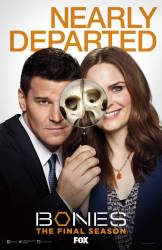The Spark in the Park - S9-E11
Revealing mistake: When the burning leg lands on the witness at the start, the flames are super imposed. (00:01:55)

The Spark in the Park - S9-E11
Revealing mistake: When the burning leg lands on the witness at the start, the flames are super imposed. (00:01:55)
Harbingers in a Fountain - S5-E1
Continuity mistake: Bones gets stabbed with a scalpel in her arm and it's bleeding profusely. However the next day she has a short sleeve top on and there is no mark or bandage on her arm. (00:30:50)
Dr. Temperance Brennan: I've never gotten a B and I never will.
Seeley Booth: That's my girl.
Trivia: When Max and Temperence go out to lunch with Temperence's cousin Margaret, Max comments that the pair are "practically sisters," and later when Margaret meets Booth, Booth asks if she is Bones' sister. The actress playing Margaret is actually Emily Deschanel's sister, Zooey.
Question: When Doctor Brennan is examining the victim's skull, she states that a "straight suture across the palatine bone" indicates that the victim was a native Japanese speaker. I've studied linguistics, but I've never heard of a person's native language actually affecting their anatomy. So, for example: would a person of Japanese heritage who was born and raised in the US and spoke only English be distinguishable from a person who grew up in Japan and spoke only Japanese, purely by their palatine bones? (00:06:10)
Separate from membership, this is to get updates about mistakes in recent releases. Addresses are not passed on to any third party, and are used solely for direct communication from this site. You can unsubscribe at any time.
Check out the mistake & trivia books, on Kindle and in paperback.
Answer: Since the palatine bone is a bone that helps form the mouth it has a lot to do with speaking. The shape of it differs a lot depending on your ethnic background. I would guess that they, in the show, meant that the person's bone tells that they were Japanese and that it was "made for the purpose of speaking Japanese." That's what I'd assume anyway. I've studied molecular biology though, so I'm not an expert on bones.